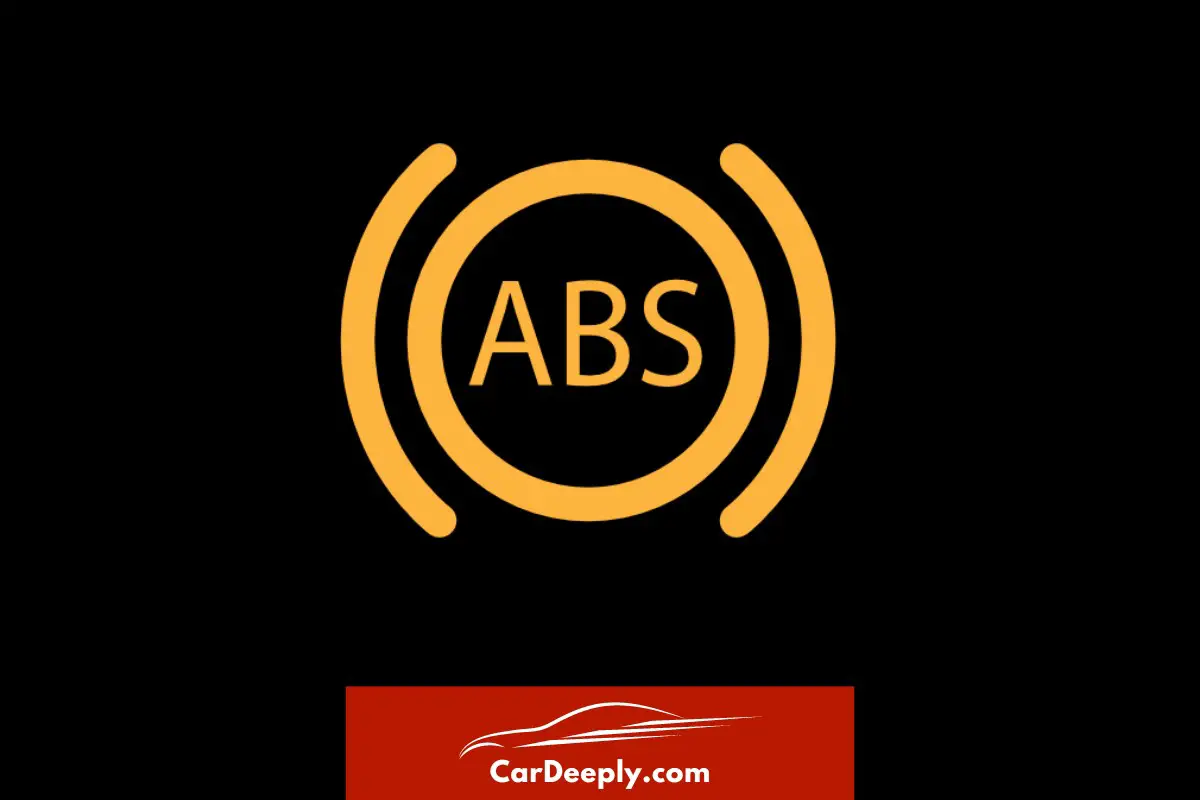Ever been cruising along only to have your journey disrupted by that dreaded ABS warning light? Ignoring it could lead to a costly disaster.
This guide will arm you with the knowledge to:
- Decode the enigma of ABS
- Identify common ABS light triggers
- Navigate safely with an active ABS light
So, don’t let that ABS light keep you in the dark. Read on and turn this potential roadblock into a mere speed bump on your driving journey!
Advertising links are marked with *. We receive a small commission on sales, nothing changes for you.
Key Takeaways
- ABS, or Anti-lock Braking System, prevents wheel lock-up during braking.
- The ABS warning light indicates potential issues with the ABS.
- Common triggers for the ABS light include a faulty ABS module and low brake fluid.
- Driving with the ABS light on is generally safe, but caution is advised.
- If the ABS light comes on, seek professional help to diagnose and fix the issue.
Understanding the Anti-lock Braking System (ABS)

Have you ever wondered what’s behind that ABS acronym on your dashboard? Let’s dive in and unravel this mystery. ABS stands for Anti-lock Braking System, a safety feature crucial to your car as seatbelts.
What is ABS?
ABS is a superhero of sorts for your vehicle. It takes action during emergencies, ensuring your tires don’t lock up while braking. This prevents your car from skidding and potentially getting into an accident.
How does ABS work?
When you slam on the brakes, ABS monitors the wheels’ rotation to detect any slip. If it senses a slip, it pumps the brakes at intervals to prevent the wheels from locking up. This reduces the risk of your car skidding off the road.
ABS doesn’t necessarily stop the car faster. Instead, it’s an automatic system that helps us control emergency braking. This way, we can still maneuver the vehicle and avoid a collision.
The ABS Warning Light
Now, let’s turn our attention to the ABS warning light.
What does it mean when the ABS light comes on?
The ABS warning light on your car dashboard usually indicates a problem with the ABS. However, other issues unrelated to the ABS can trigger this light, such as problems with related components or sensors.
Normal vs. abnormal illumination of the ABS light
Normally, the ABS light will illuminate for a few seconds after you turn on the engine. This is the ABS performing a self-check. If the ABS light stays on longer than usual, your car’s ABS is likely experiencing a problem that requires immediate attention.
On the other hand, if the ABS light suddenly comes on while you’re driving, it often signifies an issue with the ABS or braking system. If this happens, along with the brake warning light, it’s a sure sign that you have a problem with your brakes. In this case, park at a safe spot and get a tow truck to tow your car to the nearest workshop to get it checked.
So, now that we’ve got the basics down let’s delve deeper into the common reasons why your ABS light might be on. Stay tuned!
Common Reasons Why Your ABS Light is On
Let’s dive into the nitty-gritty. Here are some common culprits that might be causing your ABS light to stay on:
Non-functional ABS Module
The ABS module is the brain of your ABS. It can’t receive information from the speed sensors on your car’s tires if they are corrupted or damaged. This can cause the ABS light to come on.
But that’s not all. The ABS shares several important components with the vehicle’s traction control system (TCS). So, any problem with the TCS can also trigger the ABS light.
Signs of a malfunctioning ABS module:
- Less responsive brake pedal
- Check engine light comes on
- Clicking or cracking sound when pressing the brakes
- Brakes lock up during regular driving
Low Brake Fluid
Brake fluid plays a crucial role in controlling the brake pressure in the anti-lock brake system. If there’s a leak, you might have low brake fluid, which can trigger the ABS light.
Signs of low brake fluid:
- Less responsive brakes
- Scraping or grinding sound, similar to worn brake pads
Malfunctioning Vehicle Speed Sensor
Each wheel on a modern car is equipped with a speed sensor. Any issue with the speed sensor may affect its ability to transmit critical information to the ABS, causing the ABS light to come on.
Signs of a malfunctioning speed sensor:
- Traction control light illuminates
- The car takes a long time to stop
- The vehicle loses control or traction when braking hard
Unresponsive Hydraulic Pump or Valve
The ABS controls the wheel speed via the hydraulic brake system. If the hydraulic pump or valve is damaged and not functioning properly, the ABS can’t do its job, causing the ABS warning light to illuminate.
Signs of a malfunctioning hydraulic pump/valve:
- Reduced brake performance
- Inconsistent brake performance
- Brake fluid leakage from the master cylinder
Blown Fuse
Like any other electrical component in a car, the ABS has its fuse. If the fuse blows, the system will send a warning signal that usually activates both the ABS and engine warning lights.
Is It Safe to Drive with the ABS Light On?
You can still continue driving even if your car’s ABS light is on. Your car’s brakes still function as usual and can still slow your vehicle down. However, your car’s tires risk getting locked under heavy braking.
Therefore, you should always try to fix the issue immediately if your ABS light comes on.
What to Do When the ABS Light Comes On
If you notice the ABS light illuminating while driving, drive more carefully and avoid aggressive braking. Find a safe place to park your car and immediately turn off the engine. Then, restart your machine.
If the light is still on after you continue your car, drive to a nearby workshop so a mechanic can inspect your vehicle and give you a solution to fix the ABS light problem. Remember to drive slowly and avoid heavy braking to be safe.
Frequently Asked Questions
Can a faulty ABS affect overall brake performance?
Yes, a faulty ABS can affect your overall brake performance. While the basic braking system will still function, the additional safety feature of preventing wheel lock-up during emergency braking situations provided by the ABS will be compromised.
This means your vehicle could skid or slide in certain conditions, making it harder to control.
How often should I check my ABS?
There’s no hard and fast rule for how often you should check your ABS. However, having it inspected during your regular vehicle maintenance or if you notice the ABS light coming on is a good idea.
Regular checks can help catch potential issues early and keep your ABS in shape.
Can I check the ABS myself?
While you can perform a basic check of the ABS by looking for the ABS light on your dashboard, a professional should do a thorough inspection. They have the necessary tools and expertise to accurately diagnose and fix any issues with the ABS.
Does ABS consume more fuel?
No, the ABS does not consume more fuel. It’s an electronic system that only activates when necessary, such as during hard braking or when it detects wheel slip. Therefore, it doesn’t significantly impact your vehicle’s fuel consumption.
Is ABS necessary for all types of vehicles?
While not legally required for all types of vehicles, ABS is a highly recommended safety feature. It’s particularly beneficial for cars that are often driven when sudden braking is necessary or where roads can be slippery, such as in city driving or in areas with frequent rain or snow.

Sebastian loves convertibles and drove a BMW 335i for a long time (325 hp is just a dream). Today, with two children, he is more concerned with SUVs and family-friendly vehicles. In addition to an Audi A4 Avant, he also drives a Cupra Formentor VZ – even as a family man, you can’t do without speed. Get to know Sebastian better and visit the About Us page.
Advertising links are marked with *. We receive a small commission on sales, nothing changes for you.

